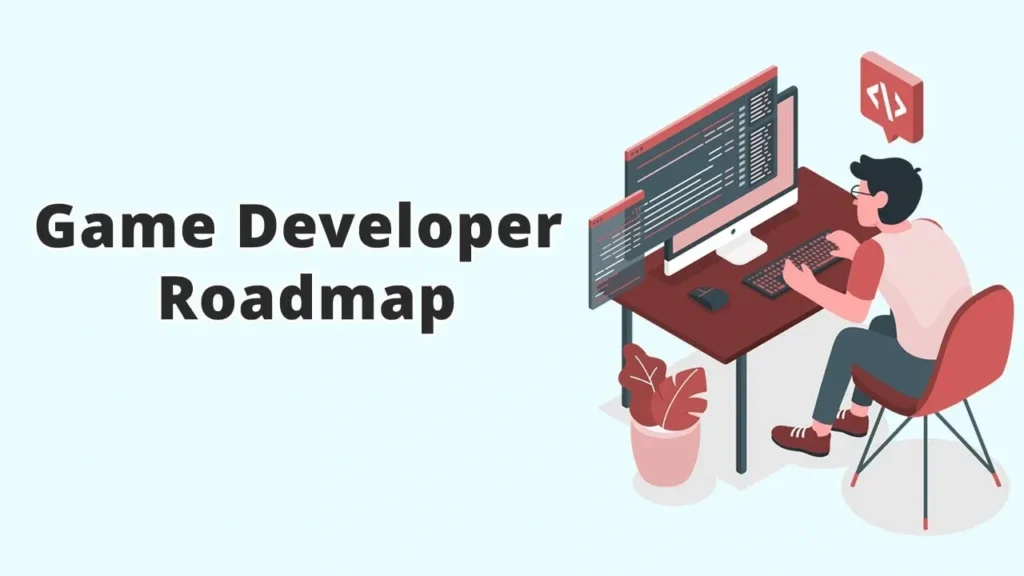Introduction
Game development is an exciting and rewarding career path that blends creativity with technical skills. Whether you dream of developing indie games or working with top gaming studios, the journey to becoming a game developer requires dedication, learning, and hands-on experience. This guide outlines a step-by-step roadmap to help you achieve your goal of becoming a successful game developer.

Key Points Overview
- Understanding the different roles in game development
- Learning programming languages
- Mastering game engines
- Developing essential game design skills
- Enhancing mathematical and logical thinking
- Building a portfolio
- Gaining practical experience through projects and internships
- Staying updated with industry trends
- Networking and job hunting in the game industry
Detailed Discussion
Understanding the Different Roles in Game Development
Game development is a vast field with multiple career paths. Before diving in, it’s essential to understand the different roles, such as:
- Game Designer – Focuses on creating game mechanics, storytelling, and user experience.
- Game Programmer – Writes code to bring the game to life.
- Game Artist – Designs characters, environments, and visual effects.
- Game Animator – Brings characters and objects to motion.
- Sound Designer – Creates sound effects and background music.
- Game Tester – Identifies and reports bugs to improve gameplay.
- Game Producer – Oversees the entire development process.
- Level Designer – Develops engaging and immersive game environments.
- UI/UX Designer – Ensures intuitive and visually appealing interfaces.
Learning Programming Languages
Game developers must learn coding languages to create gameplay mechanics and functionalities. Some of the most commonly used languages include:
- C++ – The industry standard for high-performance games.
- C# – Used for Unity game development.
- Python – Good for beginners and AI programming in games.
- JavaScript – Useful for web-based game development.
- Java – Used for Android game development.
- Swift – Required for iOS game development.
Mastering Game Engines
Game engines provide the framework to develop and optimize games. Popular choices include:
- Unity – Best for 2D and 3D game development, with C# as the primary language.
- Unreal Engine – Powerful for AAA game development, using C++ and Blueprints.
- Godot – Open-source and beginner-friendly, using GDScript.
- GameMaker Studio – Suitable for 2D game development.
- CryEngine – Known for high-end graphics rendering.
Developing Essential Game Design Skills
Game design is crucial to crafting engaging experiences. Key aspects include:
- Storytelling – Writing compelling narratives for games.
- Level Design – Creating intuitive and immersive game environments.
- UI/UX Design – Ensuring a smooth and user-friendly interface.
- Physics and Mechanics – Understanding how objects interact within the game world.
- Psychology of Gaming – Learning how players interact and engage with different mechanics.
Enhancing Mathematical and Logical Thinking
Game development requires a strong foundation in mathematics and logic. Key areas include:
- Linear Algebra – Essential for 3D transformations, vectors, and matrices.
- Trigonometry – Used for rotations, angles, and physics calculations.
- Probability and Statistics – Useful for AI behavior, game randomness, and procedural generation.
- Physics – Helps in creating realistic movement, gravity, and collision detection.
Building a Portfolio
A strong portfolio showcases your skills and projects. To build one:
- Start with small projects and game prototypes.
- Participate in game jams (e.g., Ludum Dare, Global Game Jam).
- Contribute to open-source game projects.
- Create a GitHub repository for your code samples.
- Develop a personal website to display your work.
- Publish games on platforms like Itch.io and Steam.
Gaining Practical Experience Through Projects and Internships
Hands-on experience is invaluable in game development. You can:
- Collaborate on indie game projects.
- Seek internships at game studios.
- Take part in freelancing opportunities.
- Develop and publish your own game.
- Join game development bootcamps and online training courses.
Staying Updated with Industry Trends
The gaming industry evolves rapidly, so staying informed is essential. Keep up with:
- Gaming News Websites – Follow platforms like Kotaku, IGN, and Gamasutra.
- Game Development Conferences – Attend events like GDC, E3, and SIGGRAPH.
- YouTube Tutorials and Podcasts – Watch and listen to insights from industry professionals.
- Online Courses – Websites like Udemy, Coursera, and Khan Academy offer valuable resources.
- Books on Game Development – Read industry-relevant books such as “The Art of Game Design” by Jesse Schell.
Networking and Job Hunting in the Game Industry
Building connections can open doors to job opportunities. Consider:
- Attending gaming events and conferences.
- Joining online communities (e.g., Reddit, Discord, LinkedIn).
- Engaging with industry professionals on Twitter and GitHub.
- Applying for jobs at game development companies.
- Creating a LinkedIn profile highlighting your projects and skills.
- Participating in game development competitions.
Conclusion
Becoming a game developer requires passion, continuous learning, and perseverance. By mastering programming, game engines, and design skills, building a strong portfolio, and networking with industry professionals, you can establish a successful career in game development. Start small, stay consistent, and keep creating! Game development is a journey that requires commitment, but the rewards—seeing players enjoy your creations—are well worth the effort.
FAQs
Q1: Do I need a degree to become a game developer?
A degree is beneficial but not mandatory. Many successful developers are self-taught or have attended online courses and coding bootcamps.
Q2: What is the best game engine for beginners?
Unity and Godot are great choices for beginners due to their user-friendly interfaces and extensive learning resources.
Q3: How long does it take to become a game developer?
It depends on your learning pace and dedication. With consistent effort, you can become proficient in 1-2 years.
Q4: Can I become a game developer without coding experience?
Yes, you can start with visual scripting tools like Unreal Engine’s Blueprints before transitioning to coding.
Q5: What are the best online resources to learn game development?
Some excellent platforms include Udemy, Coursera, Codecademy, and YouTube tutorials.
Q6: What are some challenges faced by game developers?
Common challenges include debugging complex code, optimizing performance, staying creative, meeting deadlines, and keeping up with industry trends.
Q7: Can I earn money as an indie game developer?
Yes! You can monetize games through platforms like Steam, Itch.io, and mobile app stores, as well as through crowdfunding, ads, and in-game purchases.
By following this roadmap, you can embark on an exciting journey into the world of game development and turn your passion into a career.







